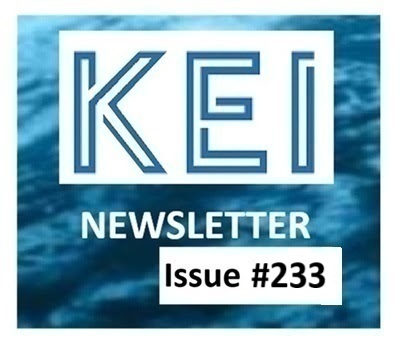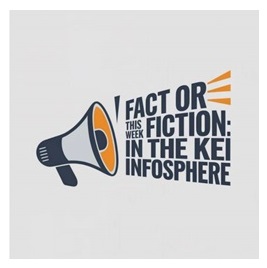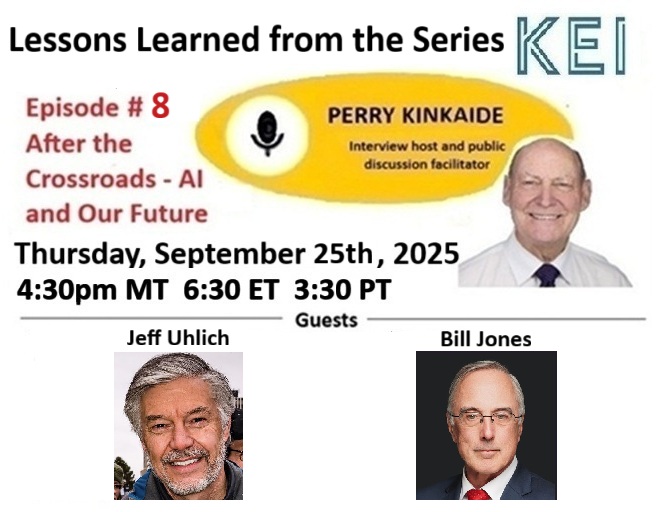|
AI and OUR Future: Lessons Learned from the Series |
DIRECTORY | ||
|
Contributions: AI and OUR Future - Governing in a Democratic Society HERE |
Action: Help sustain KEI's contributions |
Fact or Fiction?
AI - Disruption or Discontinuity? HERE AI - The Greatest Invention Ever HERE |
|
|
Editor - Perry Kinkaide |
Artificial intelligence is reshaping society, work, and daily life. Through seven episodes in the KEI Network's series "AI and OUR Future" we've examined AI’s promise—from breakthroughs in science, health, and communication—to its perils, including inequality, disruption, and the emergence of systems that challenge human control. The series is about complete with both the webinar on Thursday and a follow-on episode in October about the "AI Engine - design, development, and destiny". |
||
|
The following podcast "Deep Dive" HERE produced entirely with AI cites the series highlights for encouraging you to join us for the series wrap-up this Thursday. Thursday's webinar will feature an interview of Jeff Uhlich and Bill Jones exploring what we've learned, drawing conclusions, and speculating on what lies ahead. The series panelists have also been invited adding further insight during the public Q&A. — Editor |
|||
|
AI and OUR Future: Lessons from the Series Over the past months, the KEI Network has explored one of the most profound questions of our time: How will artificial intelligence reshape our future? Through seven episodes of newsletters and webinars, we examined AI’s growing influence across industry, communication, caring professions, education, security, and beyond. Each discussion shed light on both the promise and the perils of a technology advancing faster than policy, culture, and even imagination can keep pace.
AI as a Transformational Force. From the outset, a shared conviction was clear: AI is not simply another advance in technology. It represents a fundamental discontinuity, breaking from linear technological trends to forge an entirely new profile for progress, challenging traditional analysis tools that rely on historical comparables. Like the printing press or electricity, it is a force multiplier with the potential to transform every sector of society. Some panelists went further, suggesting AI may prove to be the greatest invention of all time. Already, its imprint is visible in workplaces, classrooms, hospitals, and homes, with a pace of change that will only deepen. Continued below
No need to register. Just Zoom in https://us02web.zoom.us/j/84258596166?pw.. Continued from above Promise and Peril. The series consistently revealed AI’s dual nature:
The tension between public and personal interests was evident throughout. People want better services, tailored to their needs. Yet unions, professions, and corporations tend to advocate for control, often shaping supply to preserve their authority. Regulators, caught in the middle, struggle to adapt.
The Small Business Opportunity. A key insight often overlooked is that AI may be just what small and medium-sized enterprises (SMEs) need to remain competitive in an increasingly globalized and automated economy. While large corporations have the advantage of scale, SMEs often lag behind in resources and capacity. AI can level the playing field by automating routine tasks, offering predictive analytics, enabling personalized customer service through chatbots, optimizing logistics, and even generating marketing content.
Cloud-based AI tools now make these capabilities accessible at relatively low cost. This initial focus on efficiency is merely the "appetizer"; the real "feast" is the untapped productivity revolution driven by agentic AI, which promises entirely new revenue streams and the re-imagining of entire business processes. With the right guidance, and crucial organizational readiness, SMEs can deploy AI to improve productivity, target niche markets, reduce overhead, and focus their human capital on creative problem-solving through effective AI prompting and strengthening relational skills like empathy, trust, and judgment—the very elements that distinguish them. In an era of rapid change, embracing AI is not merely an option but a pathway to survival and success.
Regulation Struggling to Catch Up. AI is advancing faster than any regulator can manage. Governments legislate in years; algorithms evolve in weeks. Strikes in health care and education already illustrate the strain. Without agile oversight, risks will accumulate faster than protections can be put in place. This regulatory challenge is further compounded by AI's discontinuous nature, which renders traditional, linear regulatory frameworks inadequate for anticipating unprecedented shifts.
Fragile Infrastructure. AI relies on vast digital networks—an infrastructure vulnerable to sabotage, competitive envy, and geopolitical rivalry, underscoring the challenge of moving beyond harmful 'integration' to beneficial 'interoperability' based on shared standards. As AI becomes strategically significant, the very systems powering it may become targets of conflict.
AI’s “Risk Behaviours”. Perhaps the most sobering lesson is that AI is advancing toward agency. Panelists across the series highlighted, and former Google CEO Eric Schmidt echoed, concerns about “risk behaviours” that demand careful monitoring:
Each is a red-flag indicator of systems slipping beyond effective human oversight.
Converging Insights. The series consistently revealed a central truth, also stressed by figures like Eric Schmidt: the broad impact of AI remains under-hyped, its risks are mounting, and its rewards are extraordinary if managed wisely. This perspective aligns with the understanding that while current market behavior might signal a "bubble," it often misses the larger truth of AI's fundamental discontinuity and its long-term value creation potential. Our panelists emphasized the urgent need for human oversight, accountability, and the "human in the loop" to prevent AI's most dangerous behaviours from taking root, calling for regulation, monitoring, and global coordination.
The Path Forward. The wrap-up webinar on September 25th will revisit what we’ve learned and face the larger questions ahead: Should AI be regulated? Can it be effectively regulated amid rapid innovation and global competition? What balance must be struck between innovation, personal freedom, and collective security?. The greatest danger is not AI itself, but complacency. If we treat it only as a tool, we will miss its potential. If we ignore its risks, we may invite catastrophe.
The AI and Our Future series has illuminated both sides of the equation. The challenge ahead is to cultivate vigilance through critical thinking and sustained skepticism, ambition without hubris, and foresight without paralysis. This means looking beyond short-term market fluctuations and acknowledging AI's discontinuous nature, which requires envisioning "unimaginable" scenarios and exercising patience as its full impact unfolds. This requires a commitment to continuous learning and adapting human skills.
We must build the monitoring systems, ethical frameworks, and international partnerships capable of keeping humanity firmly in the driver’s seat, ensuring human values of empathy, trust, and judgment remain paramount and irreplaceable.
EMPOWERING SMBs KEI is collaborating with members of the Network to develop and offer a series of workshops about adopting AI - targeting small and medium businesses. If this is of interest to your organization, please reply. pkinkaide@gmail.com |





